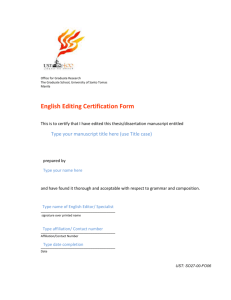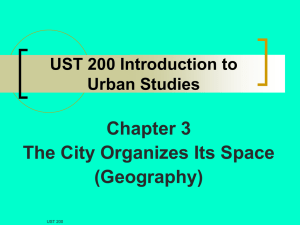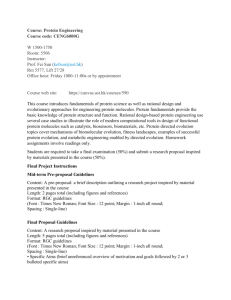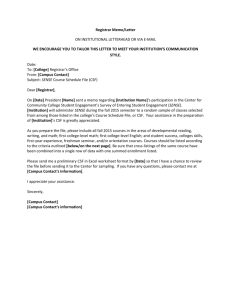UST Campus Sustainability Fund
advertisement
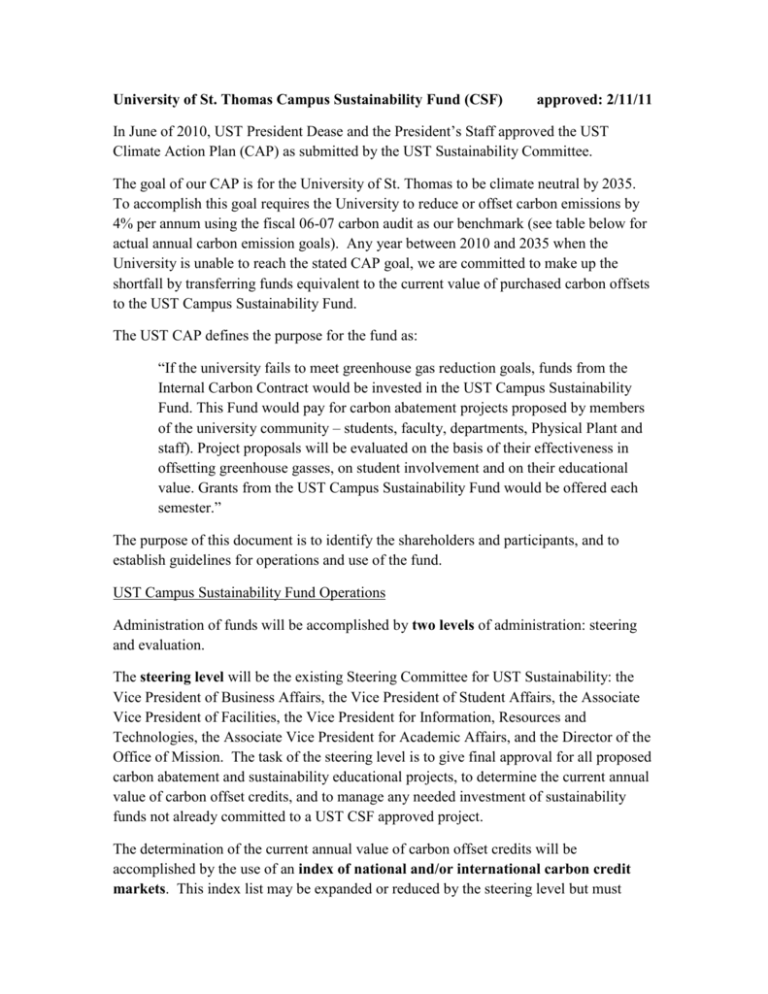
University of St. Thomas Campus Sustainability Fund (CSF) approved: 2/11/11 In June of 2010, UST President Dease and the President’s Staff approved the UST Climate Action Plan (CAP) as submitted by the UST Sustainability Committee. The goal of our CAP is for the University of St. Thomas to be climate neutral by 2035. To accomplish this goal requires the University to reduce or offset carbon emissions by 4% per annum using the fiscal 06-07 carbon audit as our benchmark (see table below for actual annual carbon emission goals). Any year between 2010 and 2035 when the University is unable to reach the stated CAP goal, we are committed to make up the shortfall by transferring funds equivalent to the current value of purchased carbon offsets to the UST Campus Sustainability Fund. The UST CAP defines the purpose for the fund as: “If the university fails to meet greenhouse gas reduction goals, funds from the Internal Carbon Contract would be invested in the UST Campus Sustainability Fund. This Fund would pay for carbon abatement projects proposed by members of the university community – students, faculty, departments, Physical Plant and staff). Project proposals will be evaluated on the basis of their effectiveness in offsetting greenhouse gasses, on student involvement and on their educational value. Grants from the UST Campus Sustainability Fund would be offered each semester.” The purpose of this document is to identify the shareholders and participants, and to establish guidelines for operations and use of the fund. UST Campus Sustainability Fund Operations Administration of funds will be accomplished by two levels of administration: steering and evaluation. The steering level will be the existing Steering Committee for UST Sustainability: the Vice President of Business Affairs, the Vice President of Student Affairs, the Associate Vice President of Facilities, the Vice President for Information, Resources and Technologies, the Associate Vice President for Academic Affairs, and the Director of the Office of Mission. The task of the steering level is to give final approval for all proposed carbon abatement and sustainability educational projects, to determine the current annual value of carbon offset credits, and to manage any needed investment of sustainability funds not already committed to a UST CSF approved project. The determination of the current annual value of carbon offset credits will be accomplished by the use of an index of national and/or international carbon credit markets. This index list may be expanded or reduced by the steering level but must include at least three recognized markets. This index will be published for the UST community and updated annually until climate neutrality is reached in 2035. An annual UST carbon audit for each fiscal year is to be completed by the Sustainability Committee, by outside consultants or as part of the curriculum by UST students with Sustainability Committee approval. The audit will be submitted to the steering level no later than December 15th of each year. The steering level final annual report on carbon emissions with notice of any needed transfer of University funds to comply with the Internal Carbon Contract will be made public to the UST community during the month of March with a posting on the UST Sustainability web site. The UST Chief Financial Officer will be responsible for moving operational funds into the UST Campus Sustainability Fund by the first class day of September. Decisions about investment of any funds not committed to approved CSF campus projects are to be made by the steering level. All investments of Sustainability Funds will be transparent to the UST community and will avoid any participation or investment with corporations that do not adhere to SA8000 global social accountability standards. CSF funds may not be transferred for any University use that is not consistent with the reduction of carbon emissions and the guidelines for CSF approved projects. Any project funding limits due to current CSF fund availability for the annual project applications must be communicated by the steering level to the evaluation level 60 days before the application deadline for use in communication to potential applicants. The second level of the CSF is the project evaluation level. This committee will consist of a minimum of five members: chair of the Environmental Studies Program (or department designee), chair of the Sustainability Committee (or committee designee), a student actively involved in a UST club focused on environmental and sustainability issues, a student member of USG, and a Student Affairs staff member. Annually in the month of October, project applications will be received from the UST community for use of the funds. UST community notices for the application deadline is the responsibility of the evaluation level and will be made public to the UST community 45 days before the annual October application due date. The evaluation level will use the following criteria for approval of projects requesting CSF funds: 1. All funded projects must directly benefit and address sustainability at the University of St. Thomas campuses. 2. All proposals for funds from the UST CSF must be submitted by a student, staff member, and/or faculty member at UST. Proposals may be submitted through one of these members of the UST community on behalf of a UST program, organization, office, or department. Individuals and organizations not directly affiliated with UST may not submit funding proposals. 3. The project must be feasible and have support from any affected campus individuals and departments. 4. Accountability for any funded project must include defined metrics for a clearly measurable outcome. These metrics will be used to evaluate the success of the project. Any funded project plan must include a schedule of appropriate progress reports to the CSF based on the duration of the project. The project must also commit to a final report within 60 days of the completion of the project. If a project has continuing benefits such as an annual cost savings or carbon reduction or educational benefit, the project plan must include plans for tracking, recording, and reporting these benefits back to the CSF on an annual basis for a minimum of 3 years. The submitters of any funded project plan that fails to complete progress or final reports will not be able to submit any future CSF proposals until the promised project report is submitted. Project reports are to be kept publicly available to the UST community by the steering level. 5. Credit will first be given for projects that are effective in offsetting greenhouse gasses and reducing the campus carbon footprint. 6. Credit will be given for projects that include student involvement and educational components for our community. 7. Credit is to be given for innovation and potential for the project to be scalable across our campuses. 8. Where applicable, preference shall be given for proposals that include lifecycle costs, possible investment payback schedules and potential long-term savings. The project evaluation level will review and respond to funding proposals within 45 days of the project submission date. Reasons for unapproved projects will be given to the submitter by the evaluation level. All approved projects will be given to the steering level who will give final approval and determination of the actual project funding based on fund availability and project guidelines. If enough funding does not exist for an approved project by the evaluation level, the steering level will so notify the project submitter of inability to fund or limits for funding along with any recommendations for continuance with a limited budget where appropriate. It is recommended that membership in the project evaluation level be rotated and that no member of the project evaluation level serve more than two years without withdrawing for one year from active administration of the UST CSF. Potential additional sources to be considered for additional funding of the UST CSF: Carbon Offset for all UST community air travel Development appeal for donated funding Student supported Sustainability fee Table of Annual Emissions Targets Year 2010 2011 2012 2013 2014 2015 2016 2017 2018 2019 2020 2021 2022 2023 2024 2025 2026 2027 2028 2029 2030 2031 2032 2033 2034 2035 UST Emissions Target Tons CO2 emitted 60,241 57,831 55,421 53,011 50,601 48,191 45,781 43,371 40,961 38,551 36,141 33,731 31,231 28,911 26,501 24,091 21,681 19,271 16,861 14,451 12,041 9,631 7,221 4,811 2,410 0

